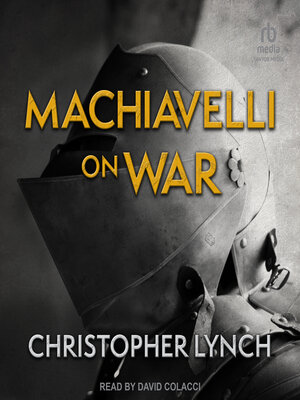
Sign up to save your library
With an OverDrive account, you can save your favorite libraries for at-a-glance information about availability. Find out more about OverDrive accounts.
Find this title in Libby, the library reading app by OverDrive.



Search for a digital library with this title
Title found at these libraries:
| Library Name | Distance |
|---|---|
| Loading... |
Machiavelli on War offers a comprehensive interpretation of the philosopher-historian's treatment of war throughout his writings, from poems and memoranda drafted while he was Florence's top official to his posthumous works, The Prince and Discourses on Livy. Christopher Lynch argues that the issue of war permeates the form and content of each of Machiavelli works, the substance of his thoughts, and his own activity as a writer, concluding that he was the first great modern philosopher because he was the first modern philosopher of war.
Lynch details Machiavelli's understanding of warfare in terms of both actual armed conflict and at the intellectual level of thinkers competing on the field of knowledge and belief. Throughout Machiavelli's works, he focuses on how military commanders' knowledge of human necessities enables and requires them to mold soldiers to best deploy them in operations attuned to political context and changing circumstances.
As Machiavelli on War makes clear, prevailing both on the battlefield and in the war of ideas demands a single-minded engagement in "reasoning about everything," beginning with oneself. For Machiavelli, Lynch shows, the successful military commander is not just an excellent leader but also an excellent human being in constant pursuit of the truth about themselves and the world.
Lynch details Machiavelli's understanding of warfare in terms of both actual armed conflict and at the intellectual level of thinkers competing on the field of knowledge and belief. Throughout Machiavelli's works, he focuses on how military commanders' knowledge of human necessities enables and requires them to mold soldiers to best deploy them in operations attuned to political context and changing circumstances.
As Machiavelli on War makes clear, prevailing both on the battlefield and in the war of ideas demands a single-minded engagement in "reasoning about everything," beginning with oneself. For Machiavelli, Lynch shows, the successful military commander is not just an excellent leader but also an excellent human being in constant pursuit of the truth about themselves and the world.







